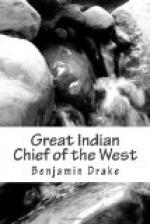“As we have given the palm to Keokuk, at this meeting, we must in justice to the Sioux, mention an eloquent reply, made by one of the same party, on a different day. The Secretary at War, met the Sioux delegation in council to treat for the purchase of some of their territory. A certain sum of money being offered them for the land, they demanded a greater price. They were then told that the Americans were a great people, who would not traffic with them like a trader—that the President had satisfied himself as to the value of the territory, and offered them the full price. Big Thunder, a son of the Little Crow, replied that the Sioux were a great nation, and could not, like a trader, ask a price and then take less: and, then to illustrate the equality of dignity, between the high contracting parties, he used a figure, which struck us as eminently beautiful—’the children of our white parent are very many, they possess all the country from the rising of the sun to noon-day:—the Sioux are very many, the land is all theirs from the noon-day to the setting sun.’”
After leaving Washington city, Keokuk, attended by his wife and son, four chiefs of the united Sac and Fox tribes, and several warriors among whom were Black Hawk and his son, proceeded as far north as Boston, and attracted in all the cities through which they passed great attention. They were met in Boston, with distinguished honors, being received by governor Everett on behalf of the state, and the mayor, on behalf of the city. The ceremony of receiving the Indians occurred on the 30th of October, and no public spectacle in the history of Boston, ever assembled so great a number of its citizens. Between the hours of ten and twelve, the chiefs held a levee in Faneuil Hall, for the visits of the ladies, exclusively, an immense concourse of whom, thronged the old “cradle of liberty” to look upon the stranger guests. At 2 o’clock, P.M. the chiefs were escorted by the Lancers to the State House, which was filled with ladies, the members of the legislature, the civil authorities, &c. Governor Everett, first addressed the audience, by giving them a brief account of the different tribes represented by the Indian chiefs then present. Then turning to the Indians, he said,




